It's Always Sunny In Philadelphia Happened Thanks To A Failed Classic Sitcom Spin-Off
"It's Always Sunny in Philadelphia" is fast approaching its 20-year anniversary. With 16 seasons under its belt (and two more on the way), it's one of the longest-running live-action sitcoms ever made. There's a lot you can credit for its success, but one thing in particular is the 2002 sitcom "That '80s Show," which is ironically one of the shortest-running live-action sitcoms ever made.
A spin-off to the massive hit that was "That '70s Show," "That '80s Show" tried and failed to catch in on '80s nostalgia. It followed a group of teens growing up in the '80s, the main one being a struggling young musician named Corey Howard, played by Glenn Howerton. Howerton did a fine job with the material the writers gave him, but there was no hiding that he was a less compelling lead character than Topher Grace's Eric Foreman.
The rest of the characters similarly lacked that special something a successful sitcom needs. "That '70s Show" instantly struck comedic gold with characters like Red, Kitty, Kelso, and Fez, but there's no instantly memorable person on "That '80s Show" for fans to fall in love with. (Also, the jokes were bad.)
The swift and merciless cancellation of the show stung for Howerton at the time, but in hindsight, it was a blessing. It paved the way for "Always Sunny," after all, which /Film has ranked on our list of best sitcoms of all time.
That '80s Show helped start Always Sunny, but not in the way you think
Most fans assume that "That '80s Show" is what put Howerton on the map. It may not have been the success he wanted, but at least it put some good TV experience under his belt and proved that he could handle the responsibilities of leading a sitcom. While there may be some truth to all of that, the real benefit of "That '80s Show" is that it gave Howerton just enough spending money to afford a nice camera.
On "The Always Sunny Podcast," where the show's cast and crew reflected on the early episodes of the show, they revealed that the invention of the Panasonic cameras in the early 2000s was a major part of what got them started. As Rob McElhenney (who plays Mac and is credited as the creator of the show) explained, "It was the first time that you could have a consumer grade camera that didn't look like a videotape." Before the 2000s, there was a major gap in quality between the sort of camera the average person could afford and the sort of camera used for professional movies and TV, but the Panasonic camera leveled the playing field slightly.
Of course, that camera was still expensive. At the time, it was well over a thousand dollars, not adjusted for inflation. Much like a big TV at the time, it was the sort of thing the average person could afford, but not a purchase recommended for anyone struggling financially. It was an extravagance.
But when Howerton, McElhenney, and Charlie Day were mulling over trying to make their own sitcom pilot without network funding, they could afford the investment in such a high-quality camera thanks to those "That '80s Show" residuals. As Howerton explained on X (formerly known as Twitter) back in 2021, he couldn't have afforded the camera if "That '80s Show" hadn't left him with some spare change:
You guys can thank "That '80s Show" for me being able to afford this camera. The one that started it all. https://t.co/lKSwVc4Aiu
— Glenn Howerton (@GlennHowerton) December 4, 2021
"You guys can thank 'That '80s Show' for me being able to afford this camera," he wrote, quote-tweeting a post containing photos of the camera and a tape that has "Sunny Ep. 1" written on it. "The one that started it all."
That '80s Show also helped motivate Howerton to become his own showrunner
Outside of the literal benefit of helping Howerton afford a camera, "That '80s Show" helped Howerton realize a few things about himself. He learned he had a good handle on what worked and what didn't in a sitcom, and that he didn't like having to work with a director who didn't take his instincts seriously. In a 2022 episode of the "Always Sunny" podcast, Howerton recalled an experience on the "That '80s Show" production where he had an idea to improve the scene, only for the director to passively shut the idea down.
"I distinctly remember the director sitting like this," Howerton said, crossing his arms. "And I could see his thought process. His thought process was, 'This is a waste of my time. Why is this f***ing kid trying to tell me how to do my job? But he's the lead of the show, so I have to just let him do what he wants.' So he was like, 'Yeah, okay. Action.' And then just like looking at his watch, you know, which of course sapped all my confidence."
Now that we've seen "That '80s Show" crash and burn while Howerton's show became a huge hit, it seems pretty clear that this director should've taken Howerton's ideas more seriously. That was Howerton's takeaway too, especially as he watched "That '80s Show" flounder in the ratings for reasons he anticipated on set.
"It was moments like that that made me realize I had strong opinions about how things should be executed. And so when we started making ["Always Sunny"], it was an opportunity to test that," Howerton explained. Although Howerton was a lead in both shows, he's had far more creative control on "Always Sunny" since day one, and the massive difference in quality between the two speaks for itself.


